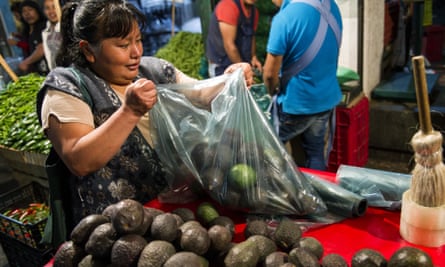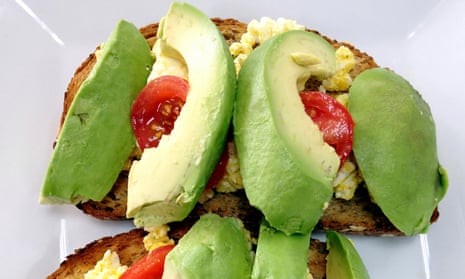Are avocados now toast, at least for the thoughtful eater? There was only ever one way for avocado adulation to go, and that was down. Just have a look at Instagram: avocado “roses”, avocado brownies, guacamole 100 ways, and avocado smoothie (again?) Even though the hipster diet deifies the avo as a staple, boredom with their ubiquity would surely have ushered in peak avocado in the fullness of time.
But what seemed a crisis in the long term now presents as a clean-eating emergency here and now with urgent warnings that in Mexico, the unprecedented international appetite for this unique fruit is indirectly fuelling illegal deforestation and environmental degradation. Those oblivious to such things in far-flung places will no doubt carry on regardless. But what are those who view the avocado as a basic food group supposed to do?
The problem is created by the fact that it’s now theoretically more profitable for Mexican farmers to grow avocados than most other crops. So much so that in Michoacán, the state that produces most of the country’s avocados and arguably the world’s avocado capital, growers are ignoring the law and thinning out mature pine forest to plant young avocado trees instead.
But what’s so bad about swapping one type of tree for another? Permanent forest doesn’t need to be sprayed with fertilisers and pesticides. It takes care of itself and acts as a vast carbon sink. Avocado plantations, on the other hand, need repeated cycles of chemical inputs. They drink up irrigation water too, lots of it, putting pressure on local water reserves. By one estimate it takes 272 litres just to grow about half a kilogram (two or three medium-sized) avocados.
The thirsty avocado isn’t just testing water levels in Mexico either. In California, avocados now vie with almonds as the top water-guzzling crop.
It’s a moot point whether the Mexicans who actually grow these on-trend fruits eventually harvest their fair share of the economic benefits. This lucrative trade is increasingly controlled by a drug cartel known as the Caballeros Templarios (Knights Templar). So when you buy a Mexican avocado, a greedy share of revenue may well accrue to criminals.
You might think, OK, I’ll buy avocados from some other less problematic source then. But would an avocado from Chile, Peru or the Dominican Republic automatically be more sustainable or equitably produced? The fact of the matter is that we know pitifully little about the environmental and working conditions of faceless people in faraway places who grow fruit for our tables, but I have seen enough of foreign fruit “farms” to suspect the worst. Fields of abysmally low-paid, often migrant workers who toil and live day-in-day-out in a trashed environment amid polluted water courses and pesticides; the latter decaying workers’ fingernails from dipping saplings into chemicals.
In most of the fruit-growing countries of Latin America, if you talk back to the management, you can expect a knock at the door of your shanty. As Banana Link, the group that raises awareness of conditions in the global food industry, has documented, Guatemala is the most dangerous. Any activist for fruit workers there courts summary dismissal or worse: kidnapping, torture, and murder. Perhaps the Caballeros Templarios in neighbouring Mexico are more tender-hearted and environmentally aware?

The fact of the matter is that the further away from home our food comes, the less chance we have of interrogating its origins and its impact on its native environment and workforce. This isn’t an argument for boycotting imports of food that cannot be grown nearer us, but it is a powerful reason for refusing to fixate on them or fetishise them as the latest novelty “superfood”.
Whether it’s Mexican avocados, or tinny-tasting, air-freighted Peruvian asparagus that has drastically depleted its local water table, these foods shouldn’t be a staple of our diets – unless we still have the stomach for them when their often unedifying back story is made plain to us.
For avocados, as for crops like pineapple and bananas, we can seek out a Fairtrade label, which guarantees producers’ working conditions and remuneration better than most in their industry. Fairtrade pioneers Equal Exchange have established a partnership with Pragor, a progressive group of small-scale avocado farmers in Michoacán who each own an average of 10 acres of land, all 100% organic. When you buy a non-Fairtrade organic avocado, you can assume that neither workers nor the environment had to bear the omnipresent health and environmental burden of repeated pesticide spraying. Isolated from Fairtrade, organic standards in themselves do not guarantee a living wage, let alone freedom from company harassment for anyone who raises that topic.
Nutritionally speaking, what’s an avocado got that you can’t get elsewhere anyway? If you’re buying it for vitamin E, sunflower seeds are a richer source. If you’re hunting down vitamin K, you’ll find heaps in broccoli and cabbage. For monounsaturated oil, turn your attention to extra virgin olive oil, olives or lamb. To pack in the folate, go for lentils and cauliflower. If we can’t be sure of making an ethical choice, there’s always an alternative.
The popularity of kale, for instance, makes all-round sense. It’s democratically cheap, its nutritional benefits and locavore credentials are impeccable, and it’s cultivated easily in the UK.
But when we pick up a fashionable import like avocado, we need to be sure that it not only benefits our personal health and wellbeing, but also that of the communities that grow it.
